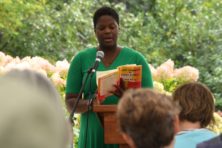Hal Prize Fiction Screening Judge: Thomas Davis
- Share
- Tweet
- Pin
- Share

We asked the group of local screening judges for the Hal Prize to share with readers and writers what they’re looking for when they go through submissions: Why does one piece of writing make it to the final round, but not another? These columns will illuminate the screeners’ process and help those who want to improve their writing – and are perhaps writing with the intention of submitting their work to the contest.
When I look at a submission of a short story, the first thing I look for is whether the author has followed the submission rules. Too often they have put their name below a story’s title or failed to correct spelling and grammar rules, even though they have been asked to do so in the directions. Violation of those simple rules too often leads to rejection.
After I have read the story, I ask myself a series of questions: Has the author understood the difference between a story and a sketch? Is there clear evidence that the author has some idea about structure? Does the main character and/or other characters change in some significant way, giving the story a reason for its existence? Are the characters drawn in a way that makes them individuals rather than a character necessary for there to be a story? Is the language especially memorable? Or beautiful? Do the events in the story have a different angle, an unusual setting, an internal logic that feels compelling? Are the events unusual or unique in some way? Is there a sense of completion with the story, or does it dangle into where nothing exists? What makes the story stand out?
Good short stories are, of course, difficult to write. A short story requires compression and a clear idea about structure. To create a character that is memorable and changed by events or internal pressures – while compressing description and details – is much more difficult than writing a full-length novel.
A sketch can be effective as a piece of writing. Mark Twain’s “The Celebrated Jumping Frog of Calaveras County” is a funny sketch that deserves to be famous. No character in the sketch, however, changes. The humor of the piece lifts it above being merely a description. A sketch making it to the final judge is possible, but you are much better off trying to ensure that the internal logic of your story results in a character (or even multiple characters) changing who they are or, at the very least, how their circumstances have changed.
The best advice I can give to someone submitting to a prestigious award such as the Hal Prize (and it is a prestigious award) is to draft your story, then rewrite it several times, polishing the language and making sure the details in the story add to what you are trying to accomplish. Spelling and grammar, a structure that is discernible to the reader, sentences that flow, action that engages, and some element in language, structure, action or character that sets the story apart are essential. I can guarantee that there are writers who are competing who will be working on every one of these elements.
The good news is that every word of your story will be read and evaluated. Good luck. Good writing. May the winds of the spirit of the Hal Prize blow over you as you prepare your manuscript!
Thomas Davis has published four novels, one nonfiction work, two epic poems and one book of poetry. His new novel, Prophecy of the Wolf, was released in spring 2023. Davis and his wife, Ethel Mortenson Davis, are the current poets laureate of Door County.







